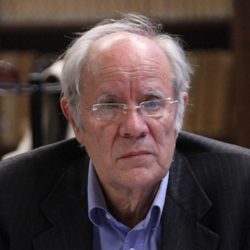
![]()
![]()
![]()
![]()
![]()
Ph.D. from the Yale University, and Magister at the Northern Illinois University.
Some of his most recent publications are:
- “In Search of George Psathas” (In: Schutzian Research, Vol. 14, 2022, pp. 15-21)
- “Methodological Atheism: An Essay in the Second-Person Phenomenology of Commitment” (In: Contemporary Phenomenologies of Normativity: Norms, Goals, and Values. 2022, pp. 43-63)
- “Life and World: Heidegger’s Phenomenological Metaphyiscs and Its Discontents” (In: Heidegger and his Anglo-American Reception, Vol. 119, 2022, pp. 135-157)
- “Commitment: What Is Self-Binding, and How Is It Possible?” (In: Ways of Being Bound: Perspectives from post-Kantian Philosophy and Relational Sociology, Vol. 39, 2022, pp. 29-46)
- “On what matters. Personal identity as a phenomenological problem” (In: Phenomenology Cognitive Sciences, vol. 20, 2021, pp. 261–279).
- “Introduction: the phenomenological method today” (In: Continental Philosophy Review, 54 (2). 2021, pp. 119-121).
- Heidegger’s Metapolitics: Phenomenology, Metaphysics, and the Volk (In: Elisa Magrì & Anna Bortolan (eds.), Empathy, Intersubjectivity, and the Social World: The Continued Relevance of Phenomenology. Essays in Honour of Dermot Moran, Degruyter. 2021. pp. 461-484)
- “Phenomenology, Ontology, Nihilism: Løgstrup, Levinas, and the Limits of Philosophical Anthropology” (In: The Monist, 103 (1). 2020, pp. 16-37).
- “Second- Person Reasons” (In: Levinas, and the Phenomenology of Reason, vol.1, Nueva York, Routledge. 2019, pp. 12-26).
- Kant and the Phenomenology of Life (In: Violetta L. Waibel, Margit Ruffing & David Wagner (eds.), Natur Und Freiheit. Akten des XII. Internationalen Kant-Kongresses, De Gruyter.2018. pp.159-184).
- “What is it to Think?” (In: Breyer, Thiemo and Guland, Christopher. Phenomenology of Thinking. Philosophical Investigations into the Character of Cognitive Experiences, London, Routledge, 2016, pp. 183-206)
- “Husserl’s Existentialism: Ideality, Traditions, and the Historical Apriori” (In: Continental Philosophy Review, vol. 49, No. 1, 2016, pp. 67-83)
- “Second-Person Phenomenology” (In: Moran, Dermot and Szanto, Thomas. The Phenomenology of Sociality: Discovering the ‘We’, London, Routledge, 2016, pp. 70-92)
- “Reading Heidegger’s Black Notebooks (In: Farin, Ingo and Malpas, Jeff. Reading Heidegger’s Black Notebooks 1931-1941, Cambridge, The MIT Press, 2016, pp. 29-44)
- “Phenomenology and Transcendental Philosophy: Making Meaning Thematic” (In: Gardner, Sebastian. The Transcendental Turn, Oxford, Oxford University Press, 2015, pp. 244-263)
- “Why is Ethics First Philosophy? Levinas in Phenomenological Context” (In: European Journal of Philosophy, vol. 23, N°. 3, 2015, pp. 564-588)
- “Responsibility, Autonomy, Affectivity: A Heideggerian Approach” (In: McManus, Denis. Heidegger, Authenticity, and the Self: Themes from Division Two of Being and Time, London, Routledge, 2014, pp. 215-242)
- “Günter Figal’s Objectivity: From Transcendental to Hermeneutical Phenomenology” (and Back) (In: Research in Phenomenology, vol. 44, N°. 1, 2014, pp. 121-134)
- “Kantianismus und Phänomenologie” (In: Römer, Inga. Affektivität und Ethik bei Kant und in der Phänomenologie, Berlin, Walter de Gruyter, 2014, pp. 19-51)
- “Transcendental Life” (In: Hartimo, Mirja; Heinämaa, Sara and Miettinen, Phenomenology and the Transcendental, London, Routledge, 2014, pp. 21-48)
- Normativity and Phenomenology in Husserl and Heidegger (Cambridge, Cambridge University Press, 2013)
- “Critique of Public Reason: Normativity, Legitimation, and Meaning in the Public Sphere” (In: Emden, Christian and Midgley, David. Beyond Habermas: Democracy, Knowledge, and the Public Sphere, New York/Oxford, Berghahn Books, 2013, pp. 147-168)
- The Cambridge Companion to Existentialism (editor. Cambridge, Cambridge University Press, 2012)
- “Phenomenology in the United States” (In: Hopkins, Burt and Drummond, John. The New Yearbook for Phenomenology and Phenomenological Philosophy, XII, 2012, pp. 183-197)
- “Reason and Will: Husserl and Heidegger on the Intentionality of Action” (In: Heidegger-Jahrbuch, vol. 6, 2012, pp. 249-268)
- “The Normative in Perception” (In: Baiasu, Roxana; Bird, Graham and Moore, A.W. Contemporary Kantian Metaphysics: New Essays on Space and Time, Houndsmills, Palgrave Macmillan, 2012, pp. 81-108)
- “Sartre’s Existentialism and the Nature of Consciousness” (In: Crowell, Steven. The Cambridge Companion to Existentialism, Cambridge, Cambridge University Press, 2012, pp. 199-226)
- “Is Transcendental Topology Phenomenological?” (In: International Journal of Philosophical Studies, vol. 19 N°. 2, 2011, pp. 267-276)
- “Measure-Taking: Meaning and Normativity in Heidegger’s Philosophy” (In: Continental Philosophy Review, vol. 41, N°. 3, 2008, pp. 261-276)
- “Phenomenological Immanence, Normativity, and Semantic Externalism” (In: Synthese, vol. 160, N°. 3, 2008, pp. 335-354)
He is currently a professor of humanities and philosophy at the Rice University, Houston (USA).



